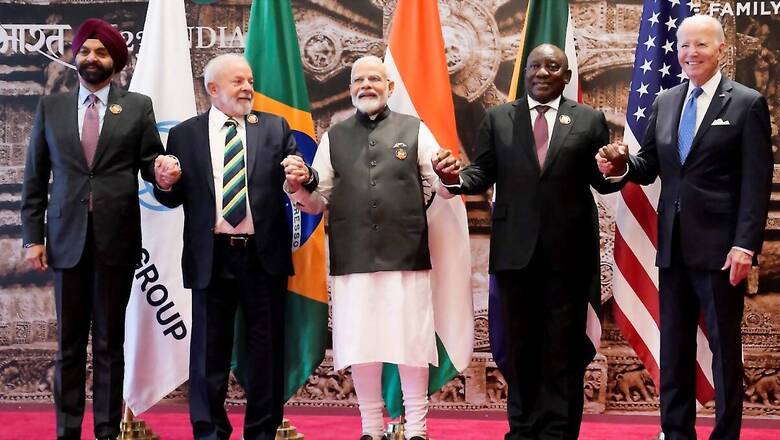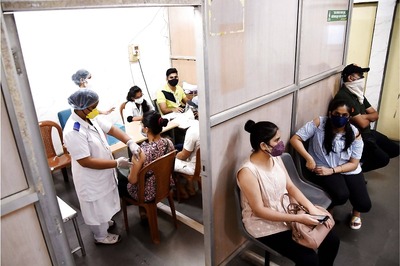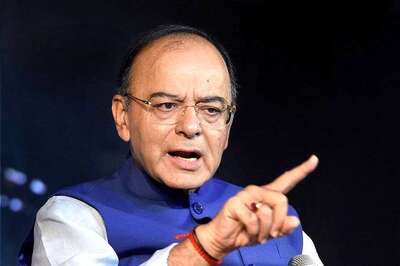
views
India’s foreign policy, as of other countries, is determined by certain permanent factors, for instance, its size, resources, geographical location and its neighbourhood. Other factors are its understanding of national interest, its historical experience, the composition of its population, its capacity to defend itself, the quality of its leadership, its self-image, and the existence of internal lobbies.
National interest in a broad sense can be defined: peace, security, economic development, prosperity for the people, and a friendly neighbourhood. But this is not dependent only on national will. The interests of other countries can conflict with the interests of another; the world is becoming interdependent and so instability elsewhere can have a wider impact. A conflict can be inflicted on a country despite its interest in maintaining peace. Its security can be threatened by a powerful neighbour. The definition of national interest is thus subject to variables.
India is one of the biggest countries in the world, an old civilisation, it has a self-image of a country that cannot subordinate itself to others and should have an independent role in international affairs.
Having emerged from colonial subjugation, it could not align itself with the West and give it control of its foreign policy. It chose to be non-aligned during the Cold War. This basic foundation of India’s foreign policy is reflected today in its attachment to strategic autonomy, friendship with all to the extent possible, and balancing its external relations to increase its freedom of choice.
The international situation is not static and therefore changes that occur require adjustments in foreign policy.
Take for instance the collapse of the Soviet Union with which we had very strong ties. It was our biggest trade and defence partner. It played a vital role on our behalf on the Kashmir issue in the UNSC and in the 1971 war that led to the creation of Bangladesh.
During the period of US unilateralism when we were subject to huge pressure by the US on Kashmir, human rights, our nuclear and missile programmes, we became part of the RIC dialogue which later evolved into BRICS as a balancing act, even as we also began to improve our ties with the US in the context of the new geopolitical realities.
We have persevered in maintaining close ties with Russia, with regular annual summits from 2000 onwards till 2021. Russia has never imposed sanctions on us. We have resisted Western sanctions on Russia. We bought the S 400 air defence system despite the threat of secondary US sanctions. We have desisted from condemning Russia’s military intervention in Ukraine. Russia has become our biggest oil supplier. All this while our ties with the US have become stronger, with defence trade with Russia declining and that with the US, France and Israel increasing.
An increase in a country’s economic growth helps in the pursuit of a more active foreign policy. China’s case is instructive. As it has grown economically, it has acquired the economic and financial muscle to pursue a more assertive foreign policy, besides strengthening its military muscle.
India too is rising economically, and as it becomes a $5 trillion economy and beyond, its ability to pursue its interests on the global stage will increase. Already, India is acting more confidently on the international stage, having become the 5th largest economy and set to become the 3rd largest before 2030. India is today being engaged by foreign powers as never before. The US president says that the relationship with India is a defining one in the 21st century. President Putin pays lavish compliments to Modi and India, stating that India under Modi pursues its national interest and resists pressure to the point that it has even surprised Putin.
India’s foreign policy has been deeply affected by its partition and the creation of Pakistan which has tried to undermine India internally and externally since its creation, with war, terrorism, religious mobilisation of the Islamic world against us, and constantly internationalising the Kashmir issue. India has been on the defensive for decades on the Kashmir issue, accepting, in particular, US and UK interference on Pakistan’s behalf.
This defensiveness explains why despite continuous provocations from Pakistan, India has engaged Pakistan in a dialogue, even after the attack on our Parliament and the horrific Mumbai attacks, with a willingness to accept the inclusion of Kashmir as an agenda item in our composite dialogue.
Former Prime Minister Vajpayee went to Lahore, Prime Minister Modi invited Nawaz Sharif to his swearing-in ceremony in 2014, and later made an impromptu visit to Lahore in 2015.
With PM Modi this defensiveness has finally been discarded. After Uri India conducted surgical strikes and after Pulwama struck at Balakot. With the revision of Article 370, the J&K issue has been taken out as an item of dialogue with Pakistan in the future.
India is focusing on the terrorism issue in bilateral and multilateral forums with some result. The power gap that has developed between India and Pakistan, and the disarray in Pakistan that has weakened international support, including in the Islamic world, on its differences with India has enabled India to reduce the salience of Pakistan in its regional strategies.
In this regard, India’s relations with the Arab world have evolved. India had close relations with the progressive, secular, anti-fundamentalist Arab regimes such as Egypt and Iraq during the heyday of the nonaligned movement, but difficult ties with the conservative Gulf monarchies. Today India has remarkably close ties with the UAE as well as strong ties with Saudi Arabia, with both countries wanting to modernise their societies and de-radicalise them. Their economic interest in India has grown. The improvement of ties began under the NDA government but has been raised to an entirely new level by the Modi government. The inauguration of a Hindu temple in the UAE by PM Modi reflects this great change, apart from the FTA with the UAE.
India has always been a strong supporter of the Palestinian cause, but with the Madrid peace accord between Israel and the PLO, it got the opening to establish diplomatic ties with Israel in 1992 under PM Narasimha Rao. India strengthened its ties with Israel under the Vajpayee government and much more vigorously under the Modi government, without disturbing its ties with the Arab countries. All along it has also supported a two-state solution in Palestine. It is remarkable that under the Abraham Accords India, Israel, the UAE and the US formed the I2U2 forum of cooperation. At the G20 meeting, it was agreed to set up the India-Middle East-Europe Economic Corridor, with Israel as a partner, although this project has been disturbed by the current situation in Gaza.
China’s occupation of Tibet and its occupation and claims on Indian territory, and becoming for the first time in history contiguous to India has been the other major development that has durably affected India’s foreign policy.
India has been accommodating China for decades. It accepted Tibet as part of China in 1954. India lost the border conflict in 1962. China occupied a large part of Indian territory. In 1988 India made peace overtures to China. Under Narasimha Rao, the 1993 and 1996 Peace and Tranquility Agreements were signed. In 2003, the SR mechanism was agreed to for resolving the issue politically. In 2005, the Guiding Principles and Parameters of resolving the border issue were signed under Manmohan Singh. Under Modi, overtures were made to China. Xi visited India; Modi visited China. Two informal summits were held.
Meanwhile, China took several provocative measures, making aggressive claims on Arunachal Pradesh, issuing stapled visas to residents of that state, calling in South Tibet, giving Chinese names to locations in Arunachal Pradesh, hollowing out the SR mechanism, and disregarding the 2005 agreement on Guiding Principles and Parameters to resolve the boundary issue.
Finally, with Galwan in 2020, China violated several border agreements between the two countries and the relations have taken a nosedive consequently. India stood up to China at Doklam, as also in the Sikkim and Tawang areas. Today, Indian and Chinese troops are facing each other at the border. India is not foreseeing an early de-escalation on the border but is maintaining open the doors of negotiation. We have made it clear that relations with China cannot be normal unless the situation on the border becomes normal. Under PM Modi our diplomatic discourse on China is no longer defensive.
India is leveraging its ties with the US and allied countries to increase deterrence against China. Quad, the Malabar exercises and the Indo-Pacific concept are a part of this approach. India and the US recognise the shared threat from China’s expansionism and illegal sovereignty claims. We are cooperating with France in particular in the western Indian Ocean to monitor China’s activities. India has set up in December 2018 an Information Fusion Centre for the Indian Ocean region for maritime domain awareness. In general, India is focusing as never before on international naval cooperation in the Indian Ocean. This is very different from the time that we were averse to the presence of foreign navies in the Indian Ocean.
India has had very difficult ties with the US. India has been a victim of US sanctions since 1974. That India was a democracy and shared values with the US was disregarded and India’s strategic rise was thwarted. Indira Gandhi tried to mend ties when Reagan was in power in 1982. PV Narasimha Rao visited the US in 1994 when Clinton was in power. Vajpayee visited the US in 2000 and said India and the US were natural allies, and again in 2002 when Bush was in power. There was a continuity of policy there.
India and the US began a strategic dialogue in 2002 under Vajpayee. In 2006 the nuclear agreement was signed between India and the US under Manmohan Singh which removed a major strategic impediment in building bilateral ties and created the foundation for expanding them.
Under PM Modi, India-US ties have risen to a different level with several bilateral visits, including a highly successful state visit in June 2023 when he addressed the US Congress, the only Indian leader to do so twice. Defence ties have expanded, foundational agreements in the defence area have been signed, major defence platforms have been acquired, and the US has become India’s biggest trade partner. The basis for cooperation in critical and emerging technologies has been established with the creation of the ICET mechanism.
Yet, India is a member of BRICS and the SCO, as part of its policy of international balancing, evolving from non-alignment to multi-alignment, and preserving its strategic autonomy.
All previous governments have announced Neighbourhood First policies, with IK Gujral basing it even on non-reciprocity. The Modi government has carried this policy much further, with several visits to Nepal and Sri Lanka, and a transformation of our ties with Bangladesh. With Nepal and Sri Lanka, the Modi government, unlike the previous ones, is also playing the card of religious affinities. Relations with the Maldives were strengthened under the Solih government but have received a setback under the Muizzu government.
China has made major inroads into our neighbourhood but India is countering the challenge. India has to accept the reality that our neighbours will play the China card against us and keep testing our red lines.
India has believed in Afro-Asian solidarity. It supported African liberation movements and took a principled position on apartheid from the days of the Congress government after our independence. India has had a strongly Africa-oriented policy. This has endured, with its assistance programmes for Africa, the India-Africa summits both under the UPA and BJP governments and the latest initiative taken by India under PM Modi to include the African Union as a G20 member.
India’s foreign policy is today much more confident and self-assured. We are conveying our foreign policy thinking to the international audience much more than ever before, and with much less inhibition. It is no longer an India looking for assistance, India is itself providing a lot of assistance to developing countries in the neighbourhood and Africa in particular. India is cultivating a wide range of countries, with Modi visiting countries which had not been visited by an Indian PM for years.
India’s stature has grown to the extent that under PM Modi it holds joint meetings with, for example, the leaders of Nordic countries, the Central Asian countries, the Pacific Island states, the CARICOM, besides the fact that leaders of all the ASEAN countries were chief guests at India’s R-Day celebrations in 2018.
In climate change negotiations, India has both stood its ground on key issues of national interest and become a positive interlocutor as well, changing perceptions about India from a naysayer to a credible stakeholder. India, under Modi, has taken the initiative to set up the International Solar Alliance, it has launched the Coalition for a Disaster Resilient Infrastructure, it is meeting its commitments under the Paris Agreement, and has set a target of 500 GW of renewable energy capacity by 2030, etc.
India is positioning itself as a “leader” of the Global South, which is both a continuation of its long-standing policy and a marked change from the past. The G20 presidency gave India the opportunity to take this leadership role to a new level by organising the Voice of the Global South summit in January 2023. India was successful in putting the views and priorities of the Global South on the G20 agenda, be it food, fertiliser and energy issues, reform of multilateralism, the working of Multilateral Development Banks, debt relief, accelerating the achievements of SDGs, financial and technological transfers to developing countries to address Climate Change issues, etc. The G20 agenda is no longer G7-oriented.
India is projecting itself as a civilisational power. It has introduced its own ideas in international discourse. This is apart from the UN declaring International Yoga Day on June 21. These include Vasudhaiva Kutumbakam, One Future Alliance, and Global Initiative for Public Health — building on its Vaccine Maitri diplomacy that won it great goodwill in developing countries. Other ideas are Global Food Supply Chain, LiFE, a human-centric approach to technology, Global Digital Public Infrastructure, etc.
A major change is the intensity with which the Modi government is dealing with the Indian diaspora. Modi has electrified the Indian diaspora with his stirring addresses and given them a sense of pride in the country whose many achievements he highlights eloquently.
Finally, the personality of the leader matters. Modi has a knack for developing a personal rapport with foreign leaders, which is a bonus in promoting our foreign policy interests.
Kanwal Sibal is a former Indian Foreign Secretary. He was India’s Ambassador to Turkey, Egypt, France and Russia. Views expressed in the above piece are personal and solely that of the author. They do not necessarily reflect News18’s views.



















Comments
0 comment